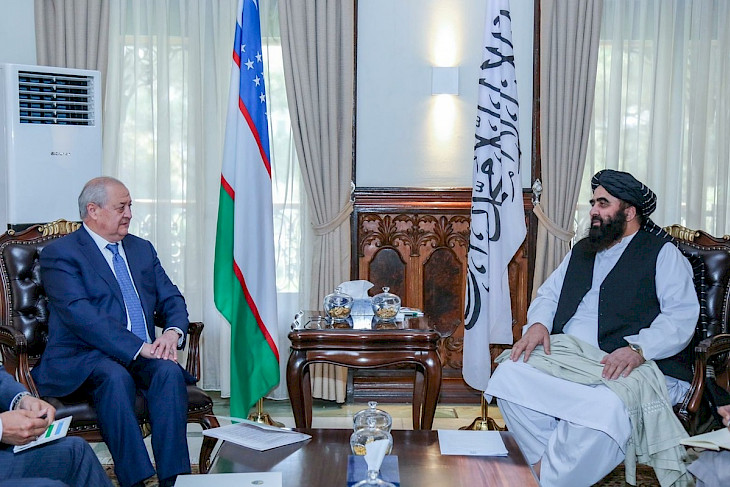Uzbekistan pursues a pragmatic and principled approach in its engagement with Afghanistan’s current authorities and supports the idea of an international dialogue involving the Taliban. This was stated by Abdullaziz Kamilov, Deputy Secretary of the Security Council under the President of Uzbekistan and Special Representative of the Head of State for Foreign Policy, in an interview with Ishonch.uz, as reported by Gazeta.uz.
"In our cooperation with Afghanistan, it’s not a matter of recognition or non-recognition. We will recognize them when the time comes - there’s no other way. But we want to take these steps together with the international community, including the United Nations," Kamilov emphasized.
He reminded that the peoples of Afghanistan and Uzbekistan have shared a common cultural and civilizational space for centuries, and these historical ties cannot be ignored.
"Our great ancestors - Abu Rayhan al-Biruni, Alisher Navoi, his teacher Lutfi, Kamoliddin Behzod, the founder of the Mughal Empire Zahiriddin Babur, the poet Mashrab - all of them are connected to Afghanistan. Many of them are buried on Afghan soil," Kamilov noted.
He also pointed to a recent gesture of goodwill by the Taliban: they sent 16 trucks of white marble from Herat to Hairatan as a gift for the restoration of the Imam al-Bukhari Memorial Complex.
"What other state is capable of such an initiative? This is proof of our spiritual closeness," he said.
According to Kamilov, the Afghan people are heroic and long-suffering, having endured interventions by the British Empire, the USSR, and NATO. What they need now is not pressure, but support.
"All of them came, destroyed a peaceful state, and now they demand that the Afghan people build a certain kind of state, have a particular composition in the new government, and implement a specific domestic policy. It’s easy to give advice. But a people who have not known peace for over 40 years need, first and foremost, assistance. That’s why our esteemed President [Mirziyoyev] from the very beginning outlined the principles for engagement with Afghanistan: dialogue and cooperation," Kamilov stressed.
He pointed out that the internal situation in Afghanistan had been extremely difficult. Under the previous government of Ashraf Ghani, they controlled only 30-40% of the territory, and 70% of the budget came from external sources.
Kamilov added that President Shavkat Mirziyoyev had previously suggested that Afghan authorities establish dialogue with the opposition, but that proposal was not heeded, and Uzbekistan began preparing for different scenarios.
"We did the right thing by initiating dialogue with the Taliban and inviting them here. Now the Taliban are in power, and we all know them. When we were inviting their delegations, major countries asked us: why are you talking to terrorists? And now many of them are seeking our help in establishing contacts with the Taliban—because we have good relations with them," he said.
Kamilov called for a genuine dialogue with the Taliban and for their participation in international platforms:
"Today, the dialogue is one-sided. For a true dialogue, you have to hear the Taliban as well. They need a voice, a platform, an invitation to international organizations, so we can hear their pain and problems. Then you can say: 'We like this, we don’t like that.' That’s how dialogue works," the Uzbek president’s special representative explained.
As an example, he referred to Yasser Arafat’s case:
"In the 1980s, Arafat was called the number one terrorist, but time passed, he spoke at the UN General Assembly, and established dialogue with Israel. Then Yasser Arafat, the Israeli Prime Minister, and Foreign Minister received the Nobel Peace Prize. War breaks a person—his mentality, his consciousness. That’s why the Afghan people, first and foremost, need support," Kamilov emphasized.
"When one person is in an accident, a psychologist is called. Here, we’re talking about an entire nation. A whole nation has not known peace for over 40 years. That’s why they need engagement, help, and support," the former Foreign Minister of Uzbekistan pointed out.
In April, President Shavkat Mirziyoyev stated that the international community underestimates the threats emanating from Afghan territory. He called for Afghanistan’s inclusion in regional projects and expressed hope for the establishment of dialogue between the international community and the Afghan authorities. He also previously proposed directing Afghanistan’s frozen assets toward addressing the country’s social issues.
CentralasianLIGHT.org
June 2, 2025

